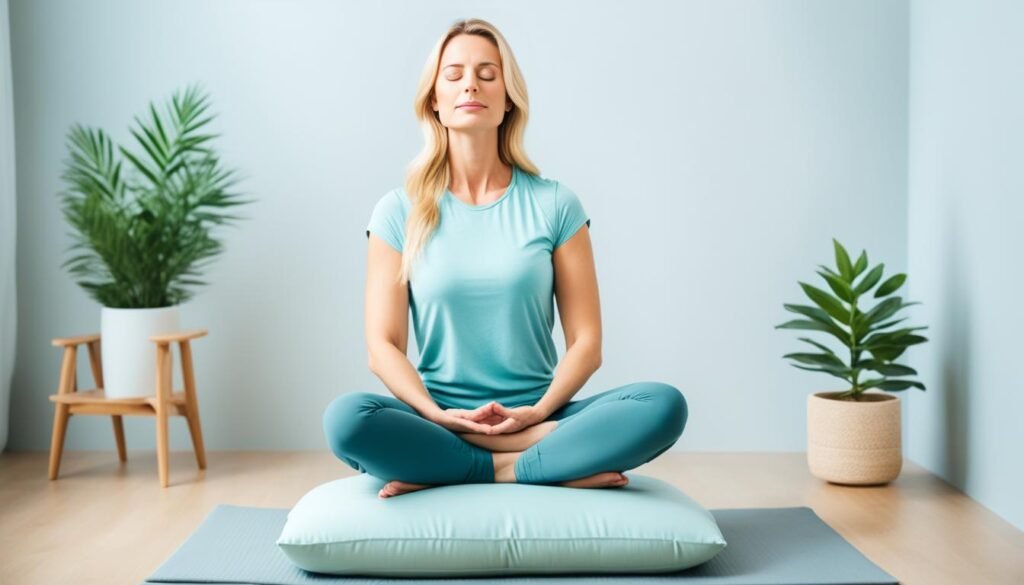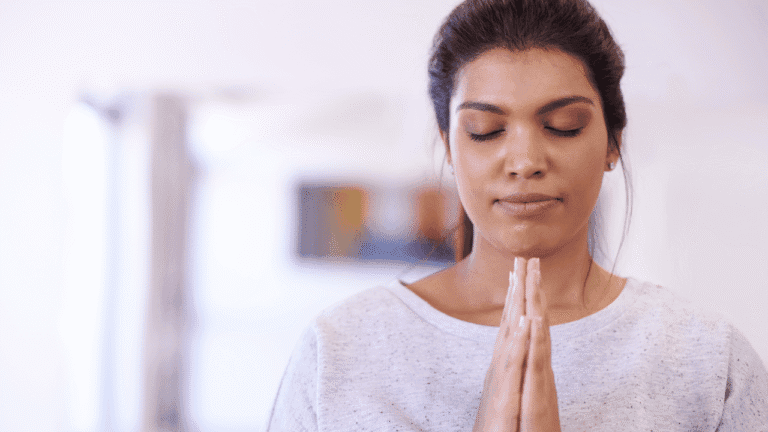Unlock the Power of Deep Meditation Techniques

Discover the transformative benefits of deep meditation techniques and unlock your full potential for inner peace and vitality. Meditation is an ancient practice that has been valued for centuries. It offers a peaceful place in your mind. Here, you can grow a deep sense of calm and self-awareness.
Studies reveal that just a few minutes of meditation each day can make a big difference. It can lower stress, reduce blood pressure, and boost overall well-being. By adding mindfulness exercises and breath awareness to your daily routine, you can unlock meditation’s power. This helps you focus better, balance your emotions, and understand your thoughts and feelings more deeply.
Practicing deep meditation regularly can also strengthen your immune system, improve heart health, and increase “feel-good” chemicals in your brain. This leads to a better mood and a deeper sense of peace. Start your meditation journey and discover your true potential for happiness and self-discovery.
Key Takeaways
- Deep meditation techniques offer a sanctuary of tranquility and promote inner peace and vitality.
- Even a few minutes of daily meditation can significantly reduce stress and enhance overall well-being.
- Mindfulness exercises and breath awareness are powerful tools for unlocking the benefits of meditation.
- Regular practice of meditation can improve focus, emotional balance, and self-understanding.
- Meditation has been shown to boost the immune system, promote cardiovascular health, and elevate mood.
Understanding the Power of Meditation: A Primer
Meditation is a powerful practice that helps you find inner strength and peace. It’s a journey to discover yourself, unlocking your hidden potential and wisdom.
Starting with meditation takes you beyond the physical world into your mind. You learn to navigate your thoughts and find peace. This is where your true power and strength lie.
Meditation is like a mental gym. It builds your mental strength to handle life’s challenges calmly. Just as exercise makes your body strong, meditation makes your mind strong. This leads to inner peace and balance.
“Meditation is a way for nourishing and blossoming the divinity within you.” – Amit Ray
Meditation’s benefits go beyond just the mind. Studies show it can improve your health too. Some benefits include:
| Health Benefit | Description |
|---|---|
| Improved Immune Response | Meditation boosts your immune system, making you less likely to get sick. |
| Reduced Blood Pressure | Meditation helps control blood pressure, lowering the risk of heart problems. |
| Enhanced Cardiovascular Health | It promotes heart health by reducing stress and improving mood. |
| Elevated Mood | Meditation releases chemicals that make you feel happy, improving your mood. |
Exploring meditation is a personal journey. There are many techniques to choose from, each helping you find peace and strength. Find the method that connects with you and lets you reach your deepest self.
Embracing meditation means starting a journey that changes your life. It reshapes your mind and transforms you. Committing to it opens the door to peace, resilience, and endless possibilities. So, breathe deeply, close your eyes, and let meditation lead you to your true strength and peace.
Choosing the Right Meditation Technique for You
Starting a meditation journey is a personal experience. It’s important to find a technique that fits your goals and comfort. There are many meditation techniques, each with its own benefits. Exploring and trying different ones can help you find what works best for you.
Different Types of Meditation Techniques
Meditation has many techniques, each with its own benefits. From ancient Buddhist teachings to modern Western practices, there’s a meditation for everyone. Let’s look at some popular and powerful techniques:
Mindfulness Meditation
Mindfulness meditation comes from Buddhist traditions. It helps you focus on the present moment. You learn to watch your thoughts and feelings without getting caught up in them. This practice can make you more accepting, clear-headed, and peaceful.
“Mindfulness meditation is the most popular and researched form of meditation in the West, with studies showing its effectiveness in reducing stress, improving emotional regulation, and enhancing overall well-being.”
Focused Meditation
If it’s hard to quiet your mind, focused meditation can help. You focus on something like your breath or a mantra. This keeps your mind sharp and brings you peace.
| Meditation Technique | Description |
|---|---|
| Transcendental Meditation® (TM®) | Involves sitting comfortably with one’s eyes closed for 20 minutes twice per day |
| Kundalini Yoga | Aims to strengthen the nervous system to cope with everyday stress and problems |
| Vipassana Meditation | Involves contemplation of key areas of human existence: suffering, impermanence, non-self, and emptiness |
| Chakra Meditation | Focuses on keeping the body’s core chakras open, aligned, and fluid |
| Qigong Meditation | A Chinese practice that harnesses energy in the body through open and fluid energy pathways |
| Sound Bath Meditation | Utilizes instruments like bowls and gongs to create sound vibrations that relax the mind |
Spiritual Meditation
Spiritual meditation connects you with a higher power or the universe. It’s often linked with Eastern religions. Through prayer, chanting, or quiet thought, it can bring a sense of purpose and peace.
The key to meditation success is not the technique, but sticking with it. Regular practice can bring many benefits, like better well-being and inner peace.
Essential Elements of Effective Meditation
To make meditation work its magic, it’s important to know the key parts that make it effective. These elements help you find peace, clarity, and well-being. By adding them to your daily routine, you can improve your life greatly.
Paying Utmost Attention to Your Environment
Choosing the right place for meditation is crucial. Pick a quiet spot where you can sit comfortably without distractions. Add things like soft lighting, calming scents, or music to help you relax. Having a special spot for meditation tells your mind it’s time to focus and be calm.
Consistently Meditating at the Same Time
Being regular with your meditation is vital. Set a specific time each day for it to make it a habit. Pick a time that fits you best, like morning or before bed. Sticking to a schedule helps deepen your practice and shows the long-term benefits of meditation.
Finding and Maintaining a Comfortable Posture
Having a comfy position is key for good meditation. You can sit on a cushion, chair, or lie down, but keep your spine straight and body relaxed. Try different positions to see what feels best for you. The goal is to be alert yet relaxed, letting your body settle into ease.
Practicing Proper Breathing Techniques
Your breath is a powerful tool in meditation. It helps keep you in the moment. Focus on your breath to quiet your mind and find stillness. Use proper breathing by inhaling deeply through your nose, letting your belly expand, and exhaling slowly through your mouth. Let the sensation of the air guide you into deep relaxation.
Cultivating a Focused Mindset
Keeping your mind focused is the heart of meditation. Thoughts will come, but watch them without getting caught up. Bring your attention back to your chosen focus, like your breath or a mantra. With time, you’ll get better at staying focused, even with distractions around.
In a 2014 study on mindfulness-based stress reduction (MBSR), participants scored significantly better on psychological tests and experienced less pain after incorporating meditation into their lives.
By adding these key elements to your meditation, you’ll unlock its full potential. Be patient and kind to yourself as you start this journey. Remember, every moment you spend meditating is a step towards better well-being and growth.
Guided Vs. Non-Guided Meditation: What’s the Difference?
Starting your meditation journey, you’ll find two main types: guided and non-guided. Guided meditation means following a teacher or recording. Non-guided meditation lets you explore your inner world in silence. Both have their benefits for mindfulness, stress reduction, and well-being.
Guided meditation is great for beginners because it offers structure and support. You can find over 400 free sessions on platforms like Declutter The Mind. These sessions last from 5 minutes to 1 hour, making them easy to fit into your day. It’s especially helpful for those with PTSD or anxiety, guiding you through tough thoughts and feelings.
Non-guided meditation gives you a personal and deep experience. You can explore your thoughts and feelings at your own pace. These sessions can last for days, offering a deep dive into your mind. Experienced meditators like these sessions for their ability to focus on the mind without distractions.
| Guided Meditation | Non-Guided Meditation |
|---|---|
| Provides structure and support for beginners | Allows for a more personal and introspective experience |
| Sessions typically range from 5 minutes to 1 hour | Can be significantly longer, sometimes lasting for days |
| Beneficial for individuals dealing with PTSD or anxiety | Favored by experienced meditators for a deeper practice |
| May disrupt a quiet meditative state with new instructions | Enables exploration of breath, sensations, and thoughts at own pace |
Live Guided Vs. Recorded Guided
Guided meditation comes in live and recorded forms. Live sessions offer a personal touch, with teachers adapting to your needs. They’re great for those who value community and connection in their practice.
Recorded meditations let you practice anytime, anywhere. You can find many free sessions on YouTube and meditation apps. They offer flexibility to explore different styles until you find what suits you best.
Ultimately, the best meditation approach is the one that encourages consistency and helps you cultivate inner peace and resilience. As you progress in your practice, you may find yourself naturally gravitating towards non-guided meditation, seeking more silence and self-directed exploration. However, guided meditation remains a valuable tool, particularly when learning new techniques or navigating challenging emotional states.
The journey of meditation is personal. What works for one might not work for another. Trust your gut, be patient, and choose the practice that feeds your mind, body, and spirit.
Simple Steps to Start Your Meditation Journey
Starting a meditation journey can change your life for the better. First, find a quiet spot where you can sit without distractions. Pick a time each day to meditate, like early morning or evening, when you’re most likely to be alone.
Then, sit in a comfortable position, like cross-legged or in a chair with your feet on the ground. Keep your back straight but not stiff, and let your hands rest on your lap. Close your eyes and focus on your breath, feeling the air move in and out of your nose.
When thoughts come, just notice them without judging. Then, bring your focus back to your breath. It’s not about stopping your thoughts, but learning to be aware of them. With time and patience, you’ll get better at watching your thoughts without getting caught up in them.
“Meditation is not a way of making your mind quiet. It is a way of entering into the quiet that is already there.” – Deepak Chopra
Here are some tips to help you meditate:
- Try Dr. Andrew Weil’s 4-7-8 Breathing Technique for a calming effect on your nerves (Fletcher, 2019)
- Focus on mindfulness meditation to be fully aware of your senses and feelings right now, without judgment (Mayo Clinic, 2020)
- Walking meditation, based on Zen Buddhism, is great for those who find it hard to sit still
| Meditation Type | Benefits |
|---|---|
| Mindfulness Meditation | Reduces stress, improves mental health, and enhances overall well-being |
| Breath-Focused Meditation | Improves attention and brain health (Trinity College Dublin, 2018) |
| Walking Meditation | Rewarding and relaxing for those who have trouble sitting still |
Starting to meditate is a journey of self-discovery and growth. Be gentle with yourself and celebrate every small success. With regular practice, you’ll see big changes, like less stress, more focus, and a better sense of well-being.
How Meditation Works
Meditation helps us reach deep relaxation and inner peace. It quiets our minds, bringing us into a state of thoughtless alertness. This state makes us fully present and aware without the constant thinking.
Our brains change a lot when we meditate. Studies show that regular meditation can make our brains work better. It increases grey matter in areas for learning, memory, and controlling emotions. It also lowers stress and anxiety by reducing activity in the amygdala.
Why You Should Meditate Consistently – The Power of Meditation for Your Life & Your Health
One meditation session can help us feel less stressed and more relaxed. But the real benefits come from doing it every day. Making meditation a daily habit changes our lives and boosts our health.
| Health Benefit | Research Findings |
|---|---|
| Reduced Stress and Anxiety | Studies have shown that mindfulness meditation can significantly reduce symptoms of stress, anxiety, and depression. |
| Improved Sleep Quality | A randomized controlled trial found that yoga nidra practice improved sleep in patients with chronic insomnia. |
| Enhanced Cognitive Function | Brief, daily meditation has been found to enhance attention, memory, mood, and emotional regulation in non-experienced meditators. |
| Increased Emotional Well-being | Research has shown that a wandering mind is an unhappy mind, and meditation can help cultivate a more focused and content state of being. |
Adding meditation to your daily routine brings many health benefits. As you keep practicing, you’ll notice its effects outside of meditation too. You’ll handle stress better, have better relationships, and feel more purposeful and fulfilled.
“Meditation is not about trying to get anywhere else. It is about allowing yourself to be exactly where you are and as you are, and for the world to be exactly as it is in this moment.” – Jon Kabat-Zinn
Start your journey with meditation for more peace, happiness, and well-being. With regular practice, you’ll unlock your mind’s full potential and enjoy the lasting effects of this powerful practice.
Meditation Rewires the Brain for Happiness, Peace & Success
Meditation does more than just help with stress and relaxation. It changes the brain in ways that make us happier, more peaceful, and successful. By making the hippocampus thicker, meditation boosts our learning, memory, and self-awareness.
Research shows that meditators have more activity in parts of the brain linked to joy, emotional balance, and control. This means meditation doesn’t just help with stress. It also makes us more optimistic and resilient. It strengthens the brain paths that lead to happiness and well-being.
The greatest discovery of my generation is that human beings can alter their lives by altering their attitudes of mind.
Meditation also changes how we connect with others. Studies show it makes us more empathetic, connected, and smart about emotions. This leads to stronger relationships and a sense of belonging and purpose.
| Brain Region | Effect of Meditation |
|---|---|
| Hippocampus | Increased gray-matter density, enhanced learning and memory |
| Prefrontal Cortex | Improved self-awareness, introspection, and decision-making |
| Insula | Heightened compassion and empathy |
| Amygdala | Reduced reactivity to stress and negative emotions |
The proof is clear: meditation is a key to personal growth. It changes our brains for the better, leading to more happiness, peace, and success. By being more mindful and compassionate, we reach our full potential and make the world a brighter place.
Meditation Reduces Stress & Anxiety
In today’s fast-paced world, stress and anxiety are common. Meditation is a powerful way to fight these mental health issues. It makes our bodies relax deeply, releasing feel-good hormones like serotonin. This helps fix cells, aids in recovery, and lowers stress hormones like cortisol and adrenaline.
A study in JAMA Internal Medicine showed that mindfulness meditation programs can reduce anxiety and depression. It looked at 47 trials with 3,515 people. Mindfulness-Based Stress Reduction (MBSR) was also found to lessen anxiety and panic in a 1992 study in the American Journal of Psychiatry.
Mindfulness-Based Cognitive Therapy (MBCT) is great for mental health. Two studies in The Journal of Consulting and Clinical Psychology in 2000 and 2008 found it cut depression relapse by 50%. The Lancet in 2015 said mixing MBCT with a slow stop of medication worked as well as staying on medication.
Meditation does more than just lower stress and anxiety. Regular practice, like the exercises in basic mindfulness exercises, can improve blood pressure, circulation, digestion, and immune function. It also helps with emotional and neurological balance, boosting overall well-being.
“Mindfulness-based therapy was found to be especially effective in reducing stress, anxiety, and depression according to a review of more than 200 studies.”
Even short mindfulness sessions can make a big difference. A study at the University of Waterloo found 10 minutes of mindfulness helped people with anxiety stay focused and perform better under disruption. This shows how easy it is to add meditation to our daily routine to handle stress and anxiety.
As we face the challenges of modern life, using meditation to reduce stress and anxiety is key. By making time for this practice, we can build inner peace, resilience, and well-being. This lets us overcome obstacles and thrive.
The Transformative Benefits of Deep Meditation Techniques
Deep meditation offers many benefits that can change your life for the better. By meditating regularly, you can find inner peace and improve your well-being. It helps you grow personally and makes life’s challenges easier to handle.
Improved Mental Focus & Creativity
Deep meditation sharpens your focus and boosts creativity. Techniques like Transcendental Meditation (TM) use a mantra to help you enter a state of deep awareness. This can improve your thinking and help you solve problems in new ways.
By meditating often, you can keep your mind sharp and open to new ideas.
Reduced Chronic Pain
For people with chronic pain, deep meditation is a natural way to find relief. Mindfulness and body scan meditation help you notice your body’s sensations without getting caught up in pain. This can lead to deep relaxation and self-discovery.
Studies show that regular meditation can cut pain levels by up to 40%. This shows how powerful these techniques can be in managing chronic pain.
Enhanced Cardiovascular Health
Deep meditation, especially TM, can improve your heart health. Regular TM practice lowers blood pressure and reduces the risk of heart disease. In fact, research found that TM can lower the risk of heart attacks, strokes, and death by 48% compared to not meditating.
Adding deep meditation to your daily routine can protect your heart and boost your overall heart health. Learn more about deep meditation’s benefits at this link.
Better Overall Health
Deep meditation also improves your overall health in many ways. It can lead to positive changes in your cells, like longer telomeres, which are linked to a longer life and better health. Meditation also boosts your immune system, aids digestion, and helps you handle stress better.
By making meditation a regular part of your routine, you’re investing in your overall health and well-being. This can lead to a healthier, more vibrant life.
Improved Sleep Quality
Struggling with sleep? Deep meditation can help. Guided meditation, for example, uses a soothing voice to calm your mind before sleep. This can help you relax and prepare for restful sleep.
Regular meditation can increase melatonin production, the hormone that regulates sleep. With time, you can develop healthier sleep habits and wake up feeling refreshed.
Start your journey to better sleep with guided meditation for beginners.
Increased Empathy & Improved Relationships
Deep meditation, especially practices like Metta meditation, can make your relationships better and increase empathy. Metta meditation involves sending love and kindness to yourself and others. This can lead to deeper connections and more understanding in your relationships.
By focusing on positive energy and others’ feelings, you become more empathetic and communicative. Deep meditation can help you build stronger, more caring relationships with others.
Embracing deep meditation is a journey of self-discovery and growth. Be patient and kind to yourself as you explore different practices. Each meditation session is a chance to connect with yourself and unlock your potential. With regular practice and an open heart, you can experience the many benefits of deep meditation and live a more fulfilling life.
9 Tips for Incorporating Meditation Into Your Already Busy Life
Adding meditation to your daily life might seem hard when you’re always busy. But, with simple steps, you can easily make it part of your day. Short meditation sessions, even just 2 minutes, can help you start a strong practice and reduce stress.
- Start small: Begin with a few minutes of meditation each day and slowly add more time as you get used to it.
- Find a quiet space: Pick a quiet spot in your home or office for meditation, away from distractions. 68% of meditators found a special spot helped their practice.
- Set a consistent time: Pick a time that fits you, like morning, lunch, or before bed. Being regular helps make it a habit.
- Utilize guided meditations: Guided meditations, apps, podcasts, and music can help beginners by giving structure and support.
- Practice mindfulness during daily activities: Use mindfulness in everyday tasks like washing dishes, walking, or commuting by focusing on your breath and staying present.
- Take advantage of waiting time: Use times you wait, like in the doctor’s office or on public transport, to meditate and find calm.
- Engage in a variety of techniques: Try different meditation styles, like loving-kindness, visualization, mindfulness, and one-seat meditation, to find what works best for you.
- Be kind to yourself: Some days might be harder than others. Be gentle with yourself and celebrate your effort, even when it’s tough.
- Reflect and journal: Take a moment before and after meditating to think about your feelings and experiences. Writing in a journal can deepen your self-awareness and give you insights.
By following these tips, you can easily add meditation to your busy life and enjoy its many benefits. Studies show that regular meditation can lower stress and anxiety, improve sleep, increase compassion, and boost emotional intelligence.
A survey found that 72% of those who meditate feel more resilient and practice better self-care thanks to it.
Even short moments of mindfulness each day can greatly improve your well-being. Start your meditation journey and see how it changes your busy life for the better.
Conclusion
Deep meditation techniques have a transformative power that can help you find inner peace and reach your full potential. By learning about meditation, picking the right method for you, and making it a daily habit, you start a deep journey of self-discovery. Whether you like guided or non-guided meditation, live or recorded sessions, sticking with it and being patient are crucial.
As meditation becomes a regular part of your life, you’ll see many benefits. It can reduce stress and anxiety, boost your focus, creativity, and health. Studies show that deep meditation can lower depression and stress, making you feel more stable, resilient, and happy.
By deepening your meditation practice, you might also see better heart health, stronger immune function, and better sleep. Deepening your practice can change your life, leading to more fulfillment and success in every area. Finding the right balance between intense and gentle practices helps you move past obstacles and reach deeper states of awareness.
Remember, there’s no “perfect” way to meditate. The key is to be open and committed to discovering yourself. With time and effort, you’ll unlock your mind’s full potential and build a lasting sense of peace and well-being.


















